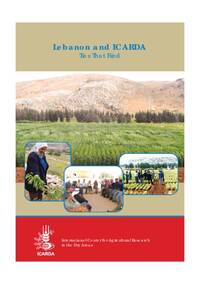Ties that Bind: Lebanon and ICARDA. 32 years of partnership for sustainable agriculture

Authors:
The International Center for Agricultural Research in the Dry Areas (ICARDA) and the Republic of Lebanon have been closely bound together since 1977, when ICARDA was established with the signing of an agreement between the government of Lebanon and the Consultative Group on International Agricultural Research (CGIAR).
ICARDA emerged from, and expanded, the former Arid Land Agricultural Development (ALAD) Program of the Ford Foundation that operated in Lebanon in the 1960s and 1970s. The objectives of that program remain valid today; to make the best use of limited water resources, to improve production of staple food crops in a region of major food gaps, and to address the complex integration of crop and livestock production in the dry areas.
Despite disruptions for various reasons in Lebanon and throughout the region that ICARDA serves, ICARDA and the Lebanese national research program have worked together in areas of mutual interest for more than 30 years. This collaboration has proved to be an enduring and successful partnership that has resulted in clear impact on farming households. This booklet presents highlights of the collaborative projects and activities undertaken over that time.
ICARDA works closely with the Lebanese Agricultural Research Institute (LARI) to strengthen agricultural research in Lebanon. In addition, LARI's Terbol and Kfardan research stations, seconded to ICARDA, provide important research sites that complement the crop improvement research and germplasm testing at ICARDA's principle research station at Tel Hadya near Aleppo, Syria. These sites represent agro-ecological conditions not available at Tel Hadya, also providing the Center with off-season sites to advance breeding of segegrating generations, multiply seeds of promising breeding lines, and screen for specific diseases for which conditions at Terbol conducive.
